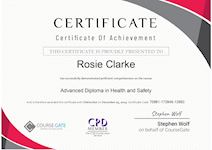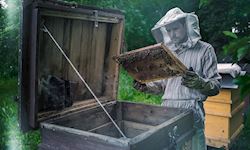Bee Farming Course
Exam Included . CPD Accredited Qualification . Lifetime access . Immediate Result
Course Gate
Summary
- Tutor is available to students
Overview
Understand the profitable business of bee farming and learn how you can become a successful bee farmer with our fantastic Bee Farming Course.
Bee farming is essential for humankind as bees are needed for the production of honey, beeswax, propolis, pollen, royal jelly and bee venom, as well as for food, medicine and income.
This Bee farming course will teach you the techniques of keeping and maintaining bees and their hives, and also helps you learn how to use the necessary equipment needed for bee farming. You will also look at queen management techniques, strategies for raising queen bees, nectar and pollen substitutions and various types of diseases and bacteria such as bee stings, Nosema and much more.
Finally, the Bee farming course covers the processing of honey and what sort of equipment is required for this.
We have designed this Bee Farming Course for both part-time and full-time students, with lessons packed into bite-sized modules for extra convenience. Tutors can always be relied on for support via email too, and upon completion, you will receive a digital certificate absolutely free.
Learning Objectives
The primary learning objectives of the Diploma in Bee Farming are to:
- Reveal everything you need to know to start a beehive.
- Provide a firm understanding of how to handle bees, including the essential clothing and equipment needed for beekeeping.
- Demonstrate queen management techniques and how to raise queen bees.
- Explore how nectar flow and bloom cycles affect bees.
- Help you familiarise with how to set up hives and install the bees.
- Give a solid understanding of how to manage the hives and inspect them regularly.
- Develop your understanding of different bacterial diseases, viruses, fungal diseases and parasites that affect honeybees, and how to treat them.
- Help you get acquainted with how bees make honey step by step and the equipment used for honey processing.
- Give an insight into when and how to extract the honey from the hives and process it.
- Offer expert training to help you earn your diploma in Bee Farming and gain all the necessary skills needed to become a certified beekeeper and turn your hobby or passion into a money-making process.
Course media
Description
What will you learn in this Bee Farming
Module 1
In this module, you will learn all about Clothing and Equipment Needed. Just make sure you have the dimensions correct because bees will build combs where you least want them. One of the most important pieces of clothing a beekeeper wears is the veil. Bee stings on the face can be very painful and there is the possibility of damage to the eyes and ears.
Module 2
This module will teach you about How to Handle Bees. Intruders are going to get stung by the bees protecting the hive. As a beekeeper, you will have to be prepared to receive your share of stings. If you have any fear of bees or of being stung, you will have to conquer those apprehensions. As you gain confidence and more adept at the handling of the bees, the stings will happen less frequently.
Module 3
In this module, you will learn all about Acquiring Bees. When purchasing established colonies, the equipment will not require any assembly. Since the queen is already laying eggs, will be able to judge her brood pattern. The chance of producing a honey crop the first year with an established colony is very good.
Module 4
This module will teach you about Queen Management Techniques. When a colony is not performing well, it is common practice to introduce a new queen into the colony. There are certain qualities that a beekeeper looks for in a queen ‘s offspring, such as good collectors of honey or pollen, resistance to disease and pests, reduced swarming, gentleness, effective pollination, and minimal propolis use. Propolis is the wax-type resin derived from a tree bee use as glue.
Module 5
In this module, you will learn all about Raising Queen Bees. The success of the colony depends largely on the quality of the queen. As a beekeeper, you may notice a difference in the production of honey from one colony to the next. The difference in production can depend on several factors, one of which is the queen. Beekeepers call this trait as “queen lessness”. When the queen is in the state does less brood rearing, drone layers and shows queen lessness, must be replaced. When beekeepers spot this condition going on in one of his colonies he will, what is known as “requeen ” the colony?
Module 6
This module will teach you about Using Nectar Substitutes. Plants have a glandular secretion, called nectar, which usually collects at the base of the flowers. Bees depend on this nectar for their source of energy. Honeybees dehydrate nectar to produce honey because it contains a low to moderate concentration of sugar.
Module 7
In this module, you will learn all about Using Pollen Substitutes. Pollen is a source of protein, vitamins, mineral and some carbohydrates for honeybees. One pollen alone does not provide a bee with all the nutrients they need to stay healthy, so a variety of pollens are needed to provide them will all the nutrients they need.
Module 8
This module will teach you about Keeping Bees in a Suburban Area. If you want to keep bees in a populated area, you will need to know the basics of bee biology, property rights, and human psychology. It can be done with very few problems. Even in a city, it is possible for bees to find enough pollen to feed them and produce a honey crop at harvest.
Module 9
In this module, you will learn all about Bacterial Diseases. The American Foulbrood, also known as AFB, is the most serious of the bacterial diseases of honeybee brood and is caused by the bacterium Paenibacillus larvae. This disease is started and can be transferred only in the spore stage. The reason for the seriousness of the disease is the spores can remain alive and last for an undetermined length of time on beekeeper’s equipment. It is highly contagious and spreads easily via contaminated equipment, hive tools, and beekeeper’s hands. The best way to handle American Foulbrood is to avoid it at all possibilities.
Module 10
This module will teach you about Viruses and Fungal Diseases. Chronic Bee Paralysis is another of the viral infections that can plague a bee colony. Like all of the other bee viruses there is no cure or medication that can be taken to eliminate the infection, the only preventative measure is sanitation.
Module 11
In this module, you will learn all about The Small Hive Beetle. You will find the adult and larvae of the small hive beetle are found in active beehives and stored bee equipment where they feed on pollen and honey. The small hive beetle is native to Africa where it requires 38-81 days to develop from egg to adult.
Module 12
This module will teach you about About Nosema. Nosema is the most widespread of the adult honey bee diseases. A single-celled animal named Nosema apis, a small, unicellular parasite specific to the honeybee, causes it. Nosema cannot exist in a laboratory culture, as with most bacteria and fungi.
Module 13
In this module, you will learn all about Bee Stings. As a beekeeper, you will be subjected to bee stings. They will decrease in time, as you become more adept at the handling of bees. If you should be stung, you will need to know what to do. When a bee stings you the stinger will remain behind because of the barbs on the stinger.
Module 14
This module will teach you about The Processing of Honey. If the world were perfect, supers would be removed and taken to the honey house, to start the processing. Here is this real world the honey can be left in the super too long. Then you have several dangers to consider. Honey remaining in the super can be subject to robbing, by insects or mice, damage by a wax moth, and fermentation.
Module 15
In this module, you will learn all about Equipment used for Honey Processing. Centrifugal extractor is based on the same principal as a centrifuge. The frame is rotated in order to throw out the honey of the super. As a beginner, you may be able to borrow one or rent one from the local association. If you are planning on making a purchase of one, you will have some choices to make. You can choose a tangential or radial, plastic or stainless steel, and manual or electric.
Method of Assessment:
Upon completion of the course, you will be required to sit for an online multiple-choice quiz based assessment, which will determine whether you have passed the course (60% pass mark). The test will be marked immediately and results will be published instantly.
Certification
After successfully completing the course, you will be able to obtain the certificates. You can claim a PDF certificate by paying a little processing fee of £2. There is an additional fee to obtain a hardcopy certificate which is £9.
Who is this course for?
Bee Farming is suitable for anyone who wants to gain extensive knowledge, potential experience and professional skills in the related field. This Bee Farming course is accredited so you don’t have to worry about the quality.
Requirements
Our Bee Farming course is open to all from all academic backgrounds and there is no specific requirements to attend this Bee Farming course. This Bee Farming course is compatible and accessible from any device including Windows, Mac, Android, iOS, Tablets etc.
Career path
This Bee Farming course opens a new door for you to enter the relevant job market and also gives you the opportunity to acquire extensive knowledge along with the required skills to become successful. You will be able to add our qualification to your CV/resume which will help you to stand out in the competitive job industry.
Questions and answers
Currently there are no Q&As for this course. Be the first to ask a question.
Reviews
Legal information
This course is advertised on reed.co.uk by the Course Provider, whose terms and conditions apply. Purchases are made directly from the Course Provider, and as such, content and materials are supplied by the Course Provider directly. Reed is acting as agent and not reseller in relation to this course. Reed's only responsibility is to facilitate your payment for the course. It is your responsibility to review and agree to the Course Provider's terms and conditions and satisfy yourself as to the suitability of the course you intend to purchase. Reed will not have any responsibility for the content of the course and/or associated materials.




